2023-2024学年译林版英语八年级上册课件 Unit 5 Wild animals Period 3 Grammar课件(54张PPT)
文档属性
| 名称 | 2023-2024学年译林版英语八年级上册课件 Unit 5 Wild animals Period 3 Grammar课件(54张PPT) |
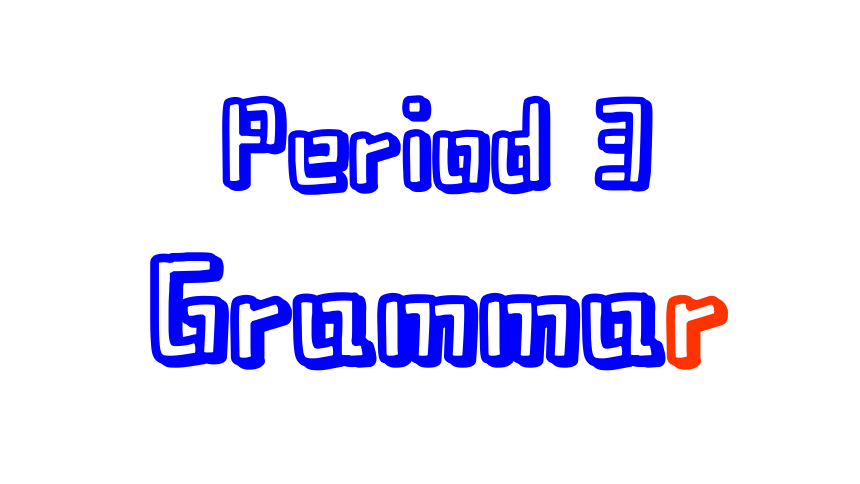
|
|
| 格式 | pptx | ||
| 文件大小 | 47.7MB | ||
| 资源类型 | 教案 | ||
| 版本资源 | 牛津译林版 | ||
| 科目 | 英语 | ||
| 更新时间 | 2023-07-30 00:00:00 | ||
图片预览


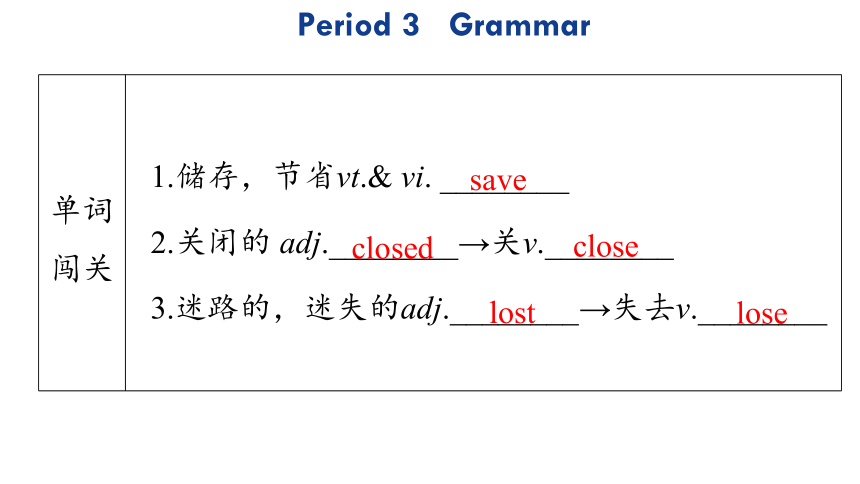

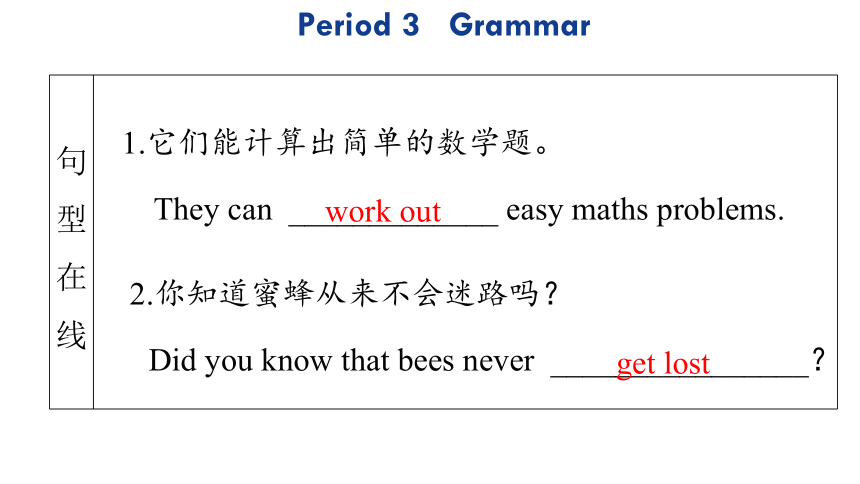
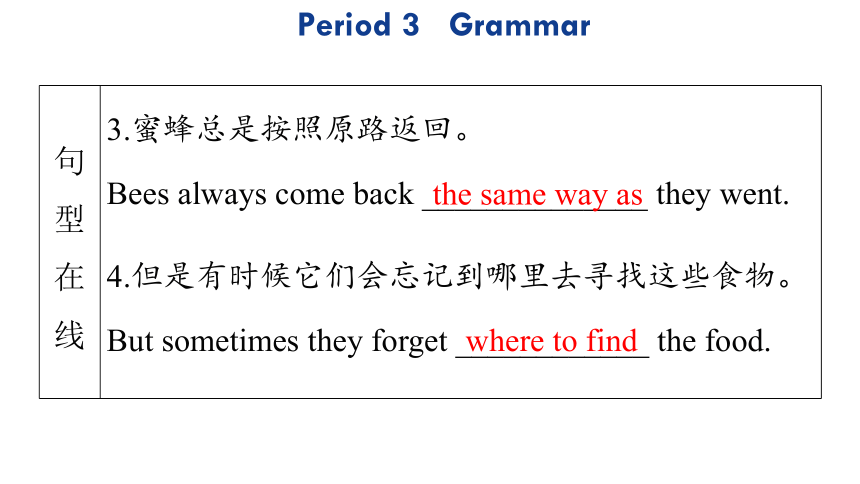
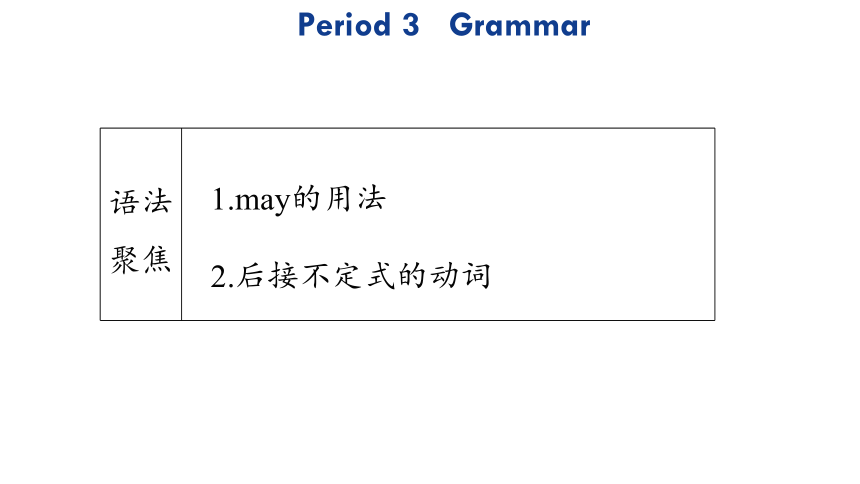

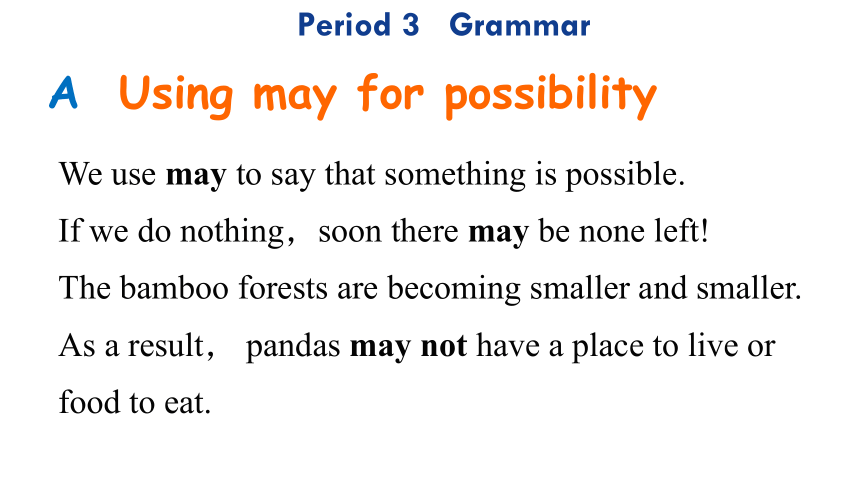

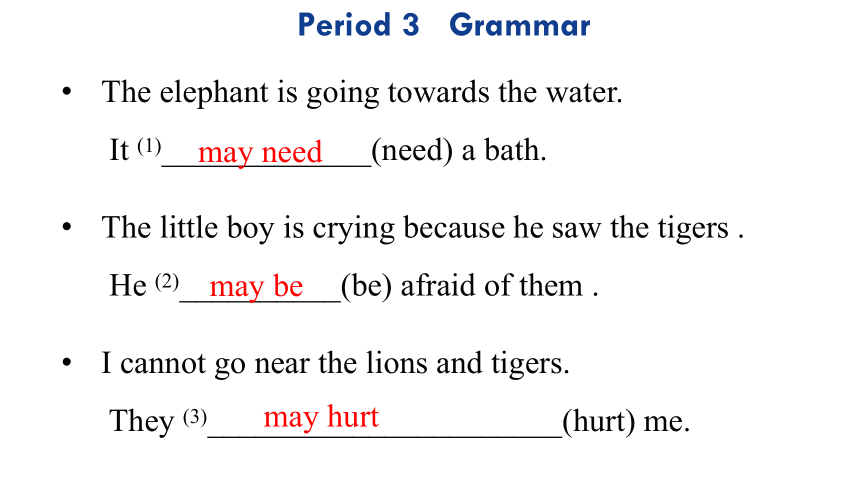
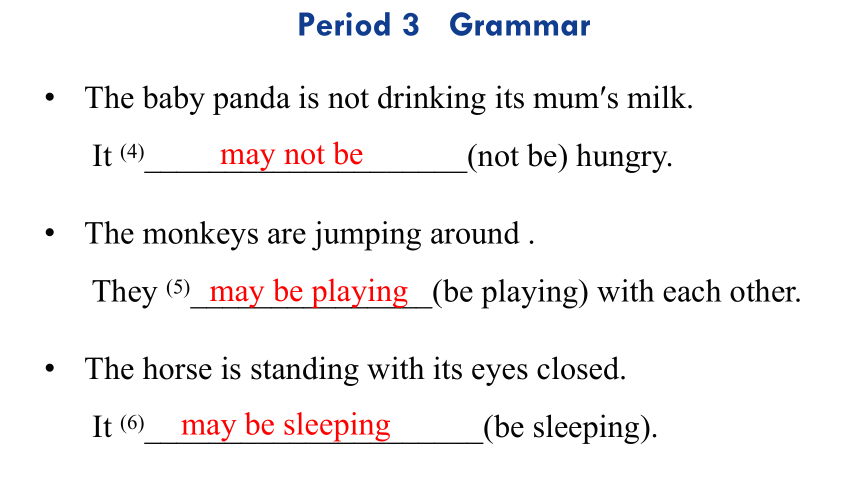
文档简介
(共54张PPT)
Period 3
Grammar
课前自主预习
单词闯关 1.储存,节省vt.& vi. ________
2.关闭的 adj.________→关v.________
3.迷路的,迷失的adj.________→失去v.________
lose
save
closed
close
lost
短语互译 1.与……同样 __________
2.在……的帮助下 _______________
3.害怕 ____________
4.get lost ____________
迷路
the same…as
with the help of…
be afraid of
句型在线 1.它们能计算出简单的数学题。
They can _____________ easy maths problems.
2.你知道蜜蜂从来不会迷路吗?
Did you know that bees never ________________?
work out
get lost
句型在线 3.蜜蜂总是按照原路返回。
Bees always come back ______________ they went.
4.但是有时候它们会忘记到哪里去寻找这些食物。
But sometimes they forget ____________ the food.
where to find
the same way as
语法聚焦 1.may的用法
2.后接不定式的动词
课文呈现
A Using may for possibility
We use may to say that something is possible.
If we do nothing,soon there may be none left!
The bamboo forests are becoming smaller and smaller. As a result, pandas may not have a place to live or food to eat.
In the zoo
Millie is in the zoo. She is telling Sandy on the phone about what plete what Millie says using may with the words in brackets.
The elephant is going towards the water.
It (1)_____________(need) a bath.
The little boy is crying because he saw the tigers .
He (2)__________(be) afraid of them .
I cannot go near the lions and tigers.
They (3)______________________(hurt) me.
may need
may be
may hurt
The baby panda is not drinking its mum′s milk.
It (4)____________________(not be) hungry.
The monkeys are jumping around .
They (5)_______________(be playing) with each other.
The horse is standing with its eyes closed.
It (6)_____________________(be sleeping).
may not be
may be playing
may be sleeping
B Using verbs + to-infinitives
We can use verbs and to-infinitives together .
At four months old,she started to go outside for the first time.
四个月大的时候,她第一次开始出门
我们可以一起使用动词和 to-不定式。
When she was six months old,she began to eat bamboo .
When she was 20 months old, she learnt to look after herself.
当她六个月大的时候,她开始吃竹子。
在她20个月大的时候,她学会了照顾自己。
We often use to-infinitives after these verbs.
agree begin decide fail
forget hope learn plan
prepare remember try want
More about wild animals
Amy′s dad is asking Amy some questions about plete their conversation with the words in brackets.
Dad:Do you know anything special about wild animals
Amy:Yes,Dad. For example, dolphins are clever.
They can (1)__________________(learn,work out)
easy maths problems.
Dad:What do you know about bats
learn to work out
Amy:Bats can′t see,but they can (2)________________
(decide,fly) the right way with the help of their
mouth and ears.
Dad:Did you know that bees never get lost
Amy:Yes. Bees always (3)__________________________
(remember,come back) the same way as they went.
fail to fly
remember to come back
Dad:What do you know about squirrels
Amy:They always (4)______________ (begin,save)
some food before winter comes .
Dad:Yes,but sometimes they forget where to find the
food.
begin to save
考点精讲
1 closed adj. 关闭的
[观察]
The horse is standing with its eyes closed.
那匹马正闭着眼睛站着。
Make sure all the windows are closed.
确保所有的窗户都关好了。
[拓展]
closed的动词形式为________,意为“________”。
[探究]
closed的反义词为________,意为“____________”。
关闭
open
开着的
close
活学活用
1. Jim lay on the bed ________ just now.
A.with the door close
B.with the door opened
C.with the door closed
D.by the door open
C
【解析】考查介词短语的用法。“with+名词+形容词”在句中作伴随状语。根据句意“吉姆刚刚关着门躺在床上”可知答案为C。
2 save vt.& vi. 储存,节省
[观察]
They always save some food before winter comes.
在冬季来临之前,它们总会储存一些食物。
Save some food for your sister. 给你姐姐留点吃的。
[探究]
save 既可作及物动词,也可作不及物动词,意为“储存,节省”。作“节省”讲时,反义词为________。
save 的过去式为________。
I′m saving for a new bike. 我正攒钱想买辆新自行车。
waste
saved
[拓展]
save作________动词,还可译为“挽救”。
________________ 表示“挽救某人的生命”。
Doctors were unable to save him.
医生未能把他救活。
及物
save one′s life
活学活用
2.(1) ─ Why is online shopping getting more and more
popular
─ I think it can ________ a lot of time.
A.protect B.save
C.begin D.take
B
(2)作为一名医生,尽全力挽救每个病人的生命是我的责任。
As a doctor, it′s my duty ___________________
every patient's life.
to try my best to save
句型透视
1 They can work out easy maths problems.
它们能计算出简单的数学题。
[探究]
work out 意为“________(答案、数量、价格等)”。
计算出
[拓展]
work out是“________________”结构,________作宾语时,放在out之后或之前均可;________作宾语时,只能放在work和out之间。
代词
动词+副词
名词
活学活用
1. Xiongan New Area will help ________ big problems
in Beijing, such as traffic jams.
A.set out B.check out
C.work out D.give out
C
【解析】考查动词短语辨析。
set out意为“动身,出发”;
check out意为“检查”;
work out意为“解决,算出”;
give out意为“分发,散发”。
根据句意“雄安新区将有助于________北京的大问题,比如交通堵塞”可知答案为C。
2 Did you know that bees never get lost
你知道蜜蜂从来不会迷路吗?。
[探究] get lost意为“________”。
[拓展] get lost的同义短语为 ________________。
lose one′s way
迷路
活学活用
2.I gave you a map so you wouldn′t get lost.
(改为同义句)
I gave you a map so you wouldn′t ______________.
lose your way
3 Bees always come back the same way as they went.
蜜蜂总是按照原路返回。
[探究]
the same…as意为“____________”,用于比较相同的事物,其中定冠词________不可以省略,________后可接名词、代词,也可接从句。
与……同样
the
as
[拓展]
be different from… 意为“________________”。
与……不同
活学活用
3.Linda′s wallet is the same colour ________ mine, but
my wallet′s style is quite different ________ hers.
A.from; as B.as; as
C.as; from D.from; from
C
【解析】考查短语辨析。根据句意“琳达的钱包和我的是一样的颜色,但是我的钱包的款式和她的是完全不同的”可知此题考查短语:
the same…as(和……一样)和be different from(与……不同)。
故选C。
语法聚焦
[[祈使句和 should 的用法]]
教材典句
1.If we do nothing, soon there may be none left!
2.The bamboo forests are becoming smaller and smaller. As a result,pandas may not have a place to live or food to eat.
3.At four months old,she started to go outside for the
first time.
4.When she was six months old, she began to eat bamboo.
5.When she was 20 months old, she learnt to look after
herself.
语法探究
● 1 may 的用法
(1)表示________
________表示“许可”时,比________更正式。
如:May I come in 我可以进来吗?
(2) 表示________
如: He may be in the classroom. 他也许在教室里。
可能
许可
may
can
● 2 后接不定式的动词
动词不定式没有________和________的变化,不受________和________________时态变化的影响。不定式在句中不能作________,但仍然保留动词的特点。不定式的基本形式是“to+动词原形”。
人称
数
主语
谓语动词
谓语
在英语中,有些动词后常接不定式:
________ to do sth 同意做某事
________ to do sth学习做某事
________ to do sth选择做某事
________ to do sth计划做某事
________ to do sth决定做某事
agree
learn
choose
plan
decide
________ to do sth准备做某事
________ to do sth希望做某事
________ to do sth想要做某事
want
prepare
hope
活学活用
1.—Mum,I′ve signed for the box. What's in it
—I′m not sure. It ________ be a present from your
uncle.
A.need B.must C.may D.will
C
【解析】考查情态动词词义辨析。need意为“需要”;must意为“一定”,表命令;may意为“或许”,表推测;will意为“将要”,表将来。
根据句意“妈妈,我已经签收了这个盒子,里面是什么?”“我不确定,它________是你舅舅寄来的礼物。”由答语第一句知,应答者并不确定盒子里的东西是什么,因此这里表“推测”。故选C。
2.—________ I park my car here for a while
—No, you mustn′t.
Do you see the sign “NO PARKING”?
A.Would B.May
C.Must D.Should
B
【解析】考查情态动词辨析。
由答语“No,you mustn′t. Do you see the sign‘NO PARKING’?”推知,上句应是表示请求允许的问句。选项中只有may可以表示有礼貌地请求。
故选B。
3.—Jack,why have you decided ________ Chinese folk
music as a course
—To learn more about Chinese culture.
A.take B.taken
C.taking D.to take
D
【解析】考查非谓语动词的用法。
decide to do sth 意为“决定做某事”。故选D。
【解析】考查非谓语动词。refuse to do sth 意为“拒绝做某事”。故选A。
4. Vivian refuses ________ her children to the weekend
training centre for extra classes.
A.to send B.sending
C.sent D.sends
A
Period 3
Grammar
课前自主预习
单词闯关 1.储存,节省vt.& vi. ________
2.关闭的 adj.________→关v.________
3.迷路的,迷失的adj.________→失去v.________
lose
save
closed
close
lost
短语互译 1.与……同样 __________
2.在……的帮助下 _______________
3.害怕 ____________
4.get lost ____________
迷路
the same…as
with the help of…
be afraid of
句型在线 1.它们能计算出简单的数学题。
They can _____________ easy maths problems.
2.你知道蜜蜂从来不会迷路吗?
Did you know that bees never ________________?
work out
get lost
句型在线 3.蜜蜂总是按照原路返回。
Bees always come back ______________ they went.
4.但是有时候它们会忘记到哪里去寻找这些食物。
But sometimes they forget ____________ the food.
where to find
the same way as
语法聚焦 1.may的用法
2.后接不定式的动词
课文呈现
A Using may for possibility
We use may to say that something is possible.
If we do nothing,soon there may be none left!
The bamboo forests are becoming smaller and smaller. As a result, pandas may not have a place to live or food to eat.
In the zoo
Millie is in the zoo. She is telling Sandy on the phone about what plete what Millie says using may with the words in brackets.
The elephant is going towards the water.
It (1)_____________(need) a bath.
The little boy is crying because he saw the tigers .
He (2)__________(be) afraid of them .
I cannot go near the lions and tigers.
They (3)______________________(hurt) me.
may need
may be
may hurt
The baby panda is not drinking its mum′s milk.
It (4)____________________(not be) hungry.
The monkeys are jumping around .
They (5)_______________(be playing) with each other.
The horse is standing with its eyes closed.
It (6)_____________________(be sleeping).
may not be
may be playing
may be sleeping
B Using verbs + to-infinitives
We can use verbs and to-infinitives together .
At four months old,she started to go outside for the first time.
四个月大的时候,她第一次开始出门
我们可以一起使用动词和 to-不定式。
When she was six months old,she began to eat bamboo .
When she was 20 months old, she learnt to look after herself.
当她六个月大的时候,她开始吃竹子。
在她20个月大的时候,她学会了照顾自己。
We often use to-infinitives after these verbs.
agree begin decide fail
forget hope learn plan
prepare remember try want
More about wild animals
Amy′s dad is asking Amy some questions about plete their conversation with the words in brackets.
Dad:Do you know anything special about wild animals
Amy:Yes,Dad. For example, dolphins are clever.
They can (1)__________________(learn,work out)
easy maths problems.
Dad:What do you know about bats
learn to work out
Amy:Bats can′t see,but they can (2)________________
(decide,fly) the right way with the help of their
mouth and ears.
Dad:Did you know that bees never get lost
Amy:Yes. Bees always (3)__________________________
(remember,come back) the same way as they went.
fail to fly
remember to come back
Dad:What do you know about squirrels
Amy:They always (4)______________ (begin,save)
some food before winter comes .
Dad:Yes,but sometimes they forget where to find the
food.
begin to save
考点精讲
1 closed adj. 关闭的
[观察]
The horse is standing with its eyes closed.
那匹马正闭着眼睛站着。
Make sure all the windows are closed.
确保所有的窗户都关好了。
[拓展]
closed的动词形式为________,意为“________”。
[探究]
closed的反义词为________,意为“____________”。
关闭
open
开着的
close
活学活用
1. Jim lay on the bed ________ just now.
A.with the door close
B.with the door opened
C.with the door closed
D.by the door open
C
【解析】考查介词短语的用法。“with+名词+形容词”在句中作伴随状语。根据句意“吉姆刚刚关着门躺在床上”可知答案为C。
2 save vt.& vi. 储存,节省
[观察]
They always save some food before winter comes.
在冬季来临之前,它们总会储存一些食物。
Save some food for your sister. 给你姐姐留点吃的。
[探究]
save 既可作及物动词,也可作不及物动词,意为“储存,节省”。作“节省”讲时,反义词为________。
save 的过去式为________。
I′m saving for a new bike. 我正攒钱想买辆新自行车。
waste
saved
[拓展]
save作________动词,还可译为“挽救”。
________________ 表示“挽救某人的生命”。
Doctors were unable to save him.
医生未能把他救活。
及物
save one′s life
活学活用
2.(1) ─ Why is online shopping getting more and more
popular
─ I think it can ________ a lot of time.
A.protect B.save
C.begin D.take
B
(2)作为一名医生,尽全力挽救每个病人的生命是我的责任。
As a doctor, it′s my duty ___________________
every patient's life.
to try my best to save
句型透视
1 They can work out easy maths problems.
它们能计算出简单的数学题。
[探究]
work out 意为“________(答案、数量、价格等)”。
计算出
[拓展]
work out是“________________”结构,________作宾语时,放在out之后或之前均可;________作宾语时,只能放在work和out之间。
代词
动词+副词
名词
活学活用
1. Xiongan New Area will help ________ big problems
in Beijing, such as traffic jams.
A.set out B.check out
C.work out D.give out
C
【解析】考查动词短语辨析。
set out意为“动身,出发”;
check out意为“检查”;
work out意为“解决,算出”;
give out意为“分发,散发”。
根据句意“雄安新区将有助于________北京的大问题,比如交通堵塞”可知答案为C。
2 Did you know that bees never get lost
你知道蜜蜂从来不会迷路吗?。
[探究] get lost意为“________”。
[拓展] get lost的同义短语为 ________________。
lose one′s way
迷路
活学活用
2.I gave you a map so you wouldn′t get lost.
(改为同义句)
I gave you a map so you wouldn′t ______________.
lose your way
3 Bees always come back the same way as they went.
蜜蜂总是按照原路返回。
[探究]
the same…as意为“____________”,用于比较相同的事物,其中定冠词________不可以省略,________后可接名词、代词,也可接从句。
与……同样
the
as
[拓展]
be different from… 意为“________________”。
与……不同
活学活用
3.Linda′s wallet is the same colour ________ mine, but
my wallet′s style is quite different ________ hers.
A.from; as B.as; as
C.as; from D.from; from
C
【解析】考查短语辨析。根据句意“琳达的钱包和我的是一样的颜色,但是我的钱包的款式和她的是完全不同的”可知此题考查短语:
the same…as(和……一样)和be different from(与……不同)。
故选C。
语法聚焦
[[祈使句和 should 的用法]]
教材典句
1.If we do nothing, soon there may be none left!
2.The bamboo forests are becoming smaller and smaller. As a result,pandas may not have a place to live or food to eat.
3.At four months old,she started to go outside for the
first time.
4.When she was six months old, she began to eat bamboo.
5.When she was 20 months old, she learnt to look after
herself.
语法探究
● 1 may 的用法
(1)表示________
________表示“许可”时,比________更正式。
如:May I come in 我可以进来吗?
(2) 表示________
如: He may be in the classroom. 他也许在教室里。
可能
许可
may
can
● 2 后接不定式的动词
动词不定式没有________和________的变化,不受________和________________时态变化的影响。不定式在句中不能作________,但仍然保留动词的特点。不定式的基本形式是“to+动词原形”。
人称
数
主语
谓语动词
谓语
在英语中,有些动词后常接不定式:
________ to do sth 同意做某事
________ to do sth学习做某事
________ to do sth选择做某事
________ to do sth计划做某事
________ to do sth决定做某事
agree
learn
choose
plan
decide
________ to do sth准备做某事
________ to do sth希望做某事
________ to do sth想要做某事
want
prepare
hope
活学活用
1.—Mum,I′ve signed for the box. What's in it
—I′m not sure. It ________ be a present from your
uncle.
A.need B.must C.may D.will
C
【解析】考查情态动词词义辨析。need意为“需要”;must意为“一定”,表命令;may意为“或许”,表推测;will意为“将要”,表将来。
根据句意“妈妈,我已经签收了这个盒子,里面是什么?”“我不确定,它________是你舅舅寄来的礼物。”由答语第一句知,应答者并不确定盒子里的东西是什么,因此这里表“推测”。故选C。
2.—________ I park my car here for a while
—No, you mustn′t.
Do you see the sign “NO PARKING”?
A.Would B.May
C.Must D.Should
B
【解析】考查情态动词辨析。
由答语“No,you mustn′t. Do you see the sign‘NO PARKING’?”推知,上句应是表示请求允许的问句。选项中只有may可以表示有礼貌地请求。
故选B。
3.—Jack,why have you decided ________ Chinese folk
music as a course
—To learn more about Chinese culture.
A.take B.taken
C.taking D.to take
D
【解析】考查非谓语动词的用法。
decide to do sth 意为“决定做某事”。故选D。
【解析】考查非谓语动词。refuse to do sth 意为“拒绝做某事”。故选A。
4. Vivian refuses ________ her children to the weekend
training centre for extra classes.
A.to send B.sending
C.sent D.sends
A
